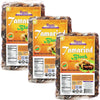You will not be allowed to compare more than 4 products at a time
View compareProduct Description
Kalonji (sometimes spelled Kaloonji or Kalongi),better known as Nigella Seeds (and/or Onion Seeds)....A Little History!
Indigenous to Western Asia, Southern Europe and the Middle East, nigell is most widely cultivated in India. Often refereed to as onion seeds, kalongi is both nutty and slightly bitter in flavor. The whole seeds are used in pulses, vegetables, chutneys and naan breads, often dry roasted before being added to a dish.
Have not Cooked with it before? RECIPE:
Tomato Curry Cook time: 20 minutes Prep time: 10 minutes
Serving size: 4 Heat level: Medium
14oz can tomatoes
1 tsp chopped ginger
2 cloves garlic chopped
1 tsp. Rani Chili Powder
1 tsp. salt
1 tsp. Rani Coriander powder
½ tsp Rani Cumin Powder
4 tbsp. vegetable or olive oil
½ tsp. Rani Kalongi (onion) seeds
½ tsp. Rani Mustard Seeds
½ tsp. Rani Fenugreek seeds
3 dried red chillies
2 tbsp. fresh lemon juice
3 hard boiled eggs
Method:
In a large mixing bowel add tomatoes, ginger, garlic, chili powder, salt coriander, cumin and blend. In sauce pan heat oil and add kalongi, mustard, fenugreek seeds, stir fry for 1 minute. Add tomato mixture to sauté pan and stir fry for about 3 minutes and reduce heat, cover and cook for 7-10min. Stir frequently. Remove from heat. Cut hard boiled eggs into quarters. Add eggs and lemon juice to sauce. Garnish with cilantro if desired.
Indigenous to Western Asia, Southern Europe and the Middle East, nigell is most widely cultivated in India. Often refereed to as onion seeds, kalongi is both nutty and slightly bitter in flavor. The whole seeds are used in pulses, vegetables, chutneys and naan breads, often dry roasted before being added to a dish.
Have not Cooked with it before? RECIPE:
Tomato Curry Cook time: 20 minutes Prep time: 10 minutes
Serving size: 4 Heat level: Medium
14oz can tomatoes
1 tsp chopped ginger
2 cloves garlic chopped
1 tsp. Rani Chili Powder
1 tsp. salt
1 tsp. Rani Coriander powder
½ tsp Rani Cumin Powder
4 tbsp. vegetable or olive oil
½ tsp. Rani Kalongi (onion) seeds
½ tsp. Rani Mustard Seeds
½ tsp. Rani Fenugreek seeds
3 dried red chillies
2 tbsp. fresh lemon juice
3 hard boiled eggs
Method:
In a large mixing bowel add tomatoes, ginger, garlic, chili powder, salt coriander, cumin and blend. In sauce pan heat oil and add kalongi, mustard, fenugreek seeds, stir fry for 1 minute. Add tomato mixture to sauté pan and stir fry for about 3 minutes and reduce heat, cover and cook for 7-10min. Stir frequently. Remove from heat. Cut hard boiled eggs into quarters. Add eggs and lemon juice to sauce. Garnish with cilantro if desired.
Frequently Asked Questions
- Q: What are the health benefits of Rani Kalonji (Nigella Sativa) seeds? A: Rani Kalonji seeds are known for their numerous health benefits, including antioxidant properties, anti-inflammatory effects, and potential support for digestive health. They are rich in essential fatty acids and can aid in improving heart health and boosting the immune system.
- Q: How can I use Kalonji seeds in cooking? A: Kalonji seeds can be used in various dishes such as curries, vegetables, and breads. They are often dry roasted to enhance their flavor and can be added to pulses, chutneys, or used as a seasoning in recipes like tomato curry.
- Q: Are Rani Kalonji seeds gluten-free and suitable for vegans? A: Yes, Rani Kalonji seeds are gluten-friendly and are suitable for vegans. They are 100% natural with no preservatives, additives, or colors, making them an excellent choice for those following a gluten-free or vegan diet.
- Q: What is the best way to store Kalonji seeds for maximum freshness? A: To maintain the maximum freshness and flavor of Rani Kalonji seeds, store them in a cool, dry place, away from direct sunlight. It is recommended to keep them in an airtight container after opening the package.
- Q: Where do Rani Kalonji seeds originate from? A: Rani Kalonji seeds, also known as Nigella Sativa or black cumin, are indigenous to Western Asia and Southern Europe, with the most significant cultivation occurring in India. Rani Brand sources its seeds from authentic Indian producers.












